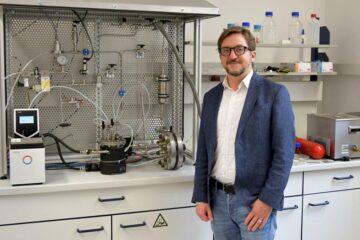ERC Advanced Grant for Tübingen Max Planck Scientist

The grant provides €2.5m over a period of five years and will support Weigel’s project IMMUNEMESIS. The scientist wants to discover how plants decide if they rather invest in growth or in the defense of bacteria, funguses, and insects.
A total of 284 so-called Advanced Grants were awarded in the Seventh EU Framework Program, funding excellent research projects of well-established scientists of all disciplines. Only 12 percent of all submitted applications were successful. Among them the application of Prof. Dr. Detlef Weigel, Director of the Department for Molecular Biology at the Max Planck Institute for Developmental Biology.
His project IMMUNMESIS, funded with €2.5m, focuses on basic research in the field of genetics and genomics. In detail, it addresses the genetic diversity between individuals of a single species and its impact on adapting to local habitats. Weigel and his team mainly use the model plant Arabidopsis thaliana and its sister species Arabidopsis lyrata to carry out their studies.
Weigel’s new research project will start on the 1st of March 2014 and will proceed for a period of five years. “The ERC Advanced Grant enables us to set up an extensive study on how plants decide when it’s time to defend themselves against enemies and when it’s time to rather boost growth,” explains Weigel.
In addition to inbreeding strains, the scientist and his team also want to examine hybrids. By crossing their parent plants, a new combination of gene variants can lead to a disproportionate enhancement or suppression of their immune responses. In the first case mentioned, dying leaves and reduced growth is the result. Previous studies of Detlef Weigel and his team successfully identified the molecular nature of a set of these genes. On this basis, the IMMUNEMESIS project will examine the frequency of such gene variants in natural plant populations, which exhibit their effect on growth and immunity only when combined.
Furthermore, it will be examined to what extent the genetic diversity of immune-gene variants in natural plant populations are influenced by the composition of microbe populations on those plants. Successful variants or successful combinations of immune-gene variants can then be selected to achieve a higher resistance to germs through selective introduction of these gene combinations.
The ERC awards Advanced Grants to leading scientists who combine outstanding research with innovative approaches. The long-term, generous funding supports projects that have the potential for a scientific breakthrough in their research area thanks to ambitious ideas, unconventional methods, and a pioneering spirit.
Media Contact
Weitere Informationen:
http://www.eb.mpg.de http://www.weigelworld.org/news/detlef-weigel-first-tubingen-mpi-director-toAlle Nachrichten aus der Kategorie: Förderungen Preise
Neueste Beiträge

Ideen für die Zukunft
TU Berlin präsentiert sich vom 22. bis 26. April 2024 mit neun Projekten auf der Hannover Messe 2024. Die HANNOVER MESSE gilt als die Weltleitmesse der Industrie. Ihr diesjähriger Schwerpunkt…

Peptide auf interstellarem Eis
Dass einfache Peptide auf kosmischen Staubkörnern entstehen können, wurde vom Forschungsteam um Dr. Serge Krasnokutski vom Astrophysikalischen Labor des Max-Planck-Instituts für Astronomie an der Universität Jena bereits gezeigt. Bisher ging…

Wasserstoff-Produktion in der heimischen Garage
Forschungsteam der Frankfurt UAS entwickelt Prototyp für Privathaushalte: Förderzusage vom Land Hessen für 2. Projektphase. Wasserstoff als Energieträger der Zukunft ist nicht frei verfügbar, sondern muss aufwendig hergestellt werden. Das…





















